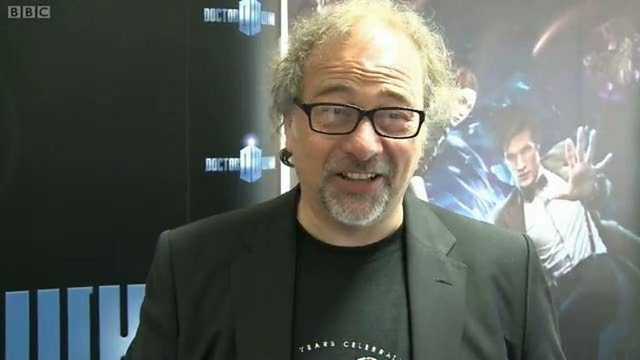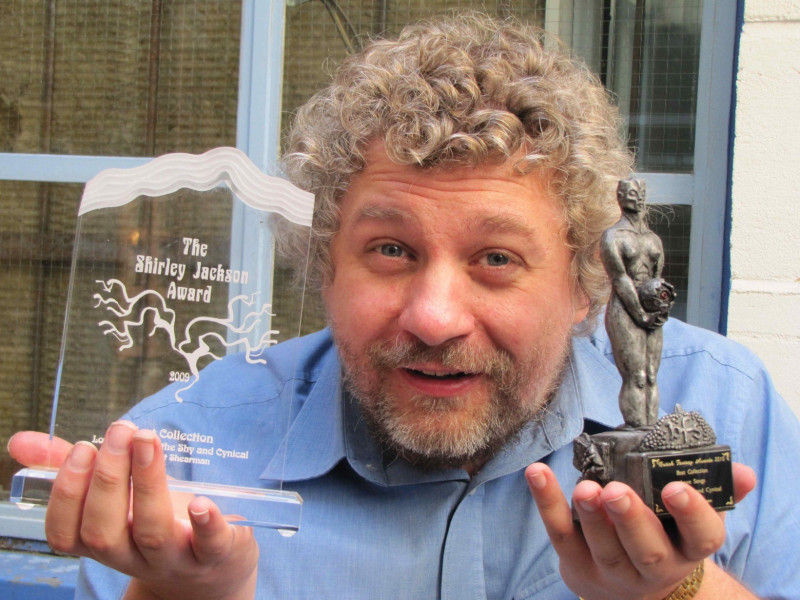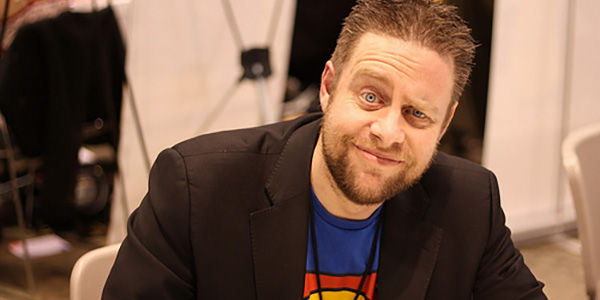Top 10 writers who should return
- Will Sanger

- Apr 5
- 11 min read

Doctor Who has had a diverse range of writers across its history which have contributed to its success. With Russell T Davies having written a majority of episodes in the past few years it has been nice to hear of new writers with stories to tell with Juno Dawson, Inua Ellams and Sharma Angel-Walfall all writing episodes for Season 2. However, with the return of Steven Moffat and Pete McTighe within this era I think there is still room for some of the older writers to return with new stories to tell. There are many who only wrote one or two stories and could have many ideas up their sleeves. Let’s delve in.
10.) Andrew Smith

Andrew Smith’s writing on Doctor Who dates back to 1980 when he wrote Full Circle for Tom Baker’s last season when he was only 17, making him the youngest ever Doctor Who writer. Unfortunately for me, Full Circle is one of the very worst Doctor Who stories. The Marshmen are a pathetic enemy for the story, and it suffers from an undefined and loose threat and a reliance upon technobabble and meaningless scientific dialogue and exposition. However, he has come back to the Doctor Who universe in more recent years and written some excellent Big Finish stories. The Sontaran Ordeal with the Eighth Doctor is a brilliant story set in the Time War which really challenges the dynamics of warlike tensions and how a character like the Doctor fits into that. It explores the warlike Sontarans as a race with powerful nuance and I love what it does with the Doctor and the Time Lords. There is a sadness and tragedy for the Doctor about the state of the universe in a time of war which has a degree of weight. He has also written some very good stories for the First Doctor Adventures. The Barbarians and the Samurai is a really excellent pure historical adventure. It shows the period and culture of the Samurai and Japan at the time from considered angles with an unravelling and interesting political plot with educational insight. Return to Skaro also manages to be a very decent sequel to the Daleks which captures the essence of the 1960s Dalek stories. Andrew Smith has definitely shown his value as a writer on Big Finish and deserves the chance to salvage his reputation on TV and show how he has grown.
9.) Phil Ford

Phil Ford, at one time, was a very reliable writer within the universe which Russell T Davies cultivated in his first era as showrunner. He co-wrote one of the very best Doctor Who stories with Russell T Davies with the Waters of Mars. This story takes a very familiar Doctor Who formula and a believable Mars setting and pushes horror to the limit. The Flood are a simply terrifying villain with a very relatable and scary idea, with the threat of water turning against us. It's also a story which pushes David Tennant’s Doctor to untested places with emotional and satisfying results which pushes boundaries for the Doctor’s character. Into the Dalek was a fairly weak story but Phil Ford’s work on the Sarah Jane Adventures has got to be considered. He became a lead writer and major creative force on the Sarah Jane Adventures, penning amazing stories such as Eye of the Gorgon, the Enemy of the Bane and the Curse of Clyde Langer. He can mix science fiction ideas with relatability and heart incredibly well. His reliability meant that he was chosen to write the stories of the Adventure Games in 2010. He made a recent return to the Whoniverse, writing three of the Tales of the Tardis episodes in 2023. Phil Ford is a very talented writer whose main skills show through where he took the Sarah Jane Adventures and the central characters. I’d love to see what other stories he could tell and where he would take the Doctor.
8.) Joy Wilkinson

Jodie Whittaker’s first series as the Doctor introduced a fresh set of writers who offered something new to Doctor Who. The Witchfinders written by Joy Wilkinson was one of the best episodes of that year, but unfortunately she hasn’t ever returned to Doctor Who, which is a massive shame. The Witchfinders isn’t a perfect episode of Doctor Who. It is plagued by the problems of the era with the wooden and generic companions and the story falls apart with the introduction of the Morax and the disappointing and rushed conclusion. Nevertheless, the story has a lot of good in it and Joy Wilkinson has a lot to offer Doctor Who. I admire the way the historical environment is framed and the fleshing out and developing of the characters. The story puts a spotlight on how women are perceived in 1612 and the difficult expectations that are put upon them. You can see the heavy burden this puts upon characters like Becka and Willa, who are forced to conform to this society controlled by men, religion and superstition. The historical characters are motivated by fear and pain, creating a world of hostility, lies and scapegoating with great consequences. Alan Cumming brings King James to life, but he is still a character of great sadness. You also wonderfully see the Doctor experience the difficulties of female authority in a challenging historical environment bringing one of Jodie Whittaker’s best performances. I’d certainly like to see what other stories Joy Wilkinson could tell.
7.) Ben Aaronovitch

There are very few writers left who worked on the original series of Doctor Who and I would really like to see what Ben Aaronovitch could do now. The Sylvester McCoy era of the show housed a lot of young talent who were getting into the industry and had grown up on Doctor Who. Ben Aaronovitch wrote Remembrance of the Daleks, which is still one of the very best Dalek stories there is. It tells a fantastic story about two factions of Daleks going up against each other with the Doctor as a clever mastermind manipulating both sides. Remembrance of the Daleks is a story which is steeped in compelling backstory with a great deal of weight. It cleverly uses the 1960s setting and backdrop of the Civil Rights movement as a way to tackle the Nazism and racism of the Daleks ideology. It makes the Daleks refreshing and approaches them from a new angle and shines a light on and represents a very real issue and gets the point of the Daleks. Remembrance of the Daleks is action focused and entertaining whilst still having meaningful depth with an unfolding narrative. Battlefield isn’t as beloved, but I’ve always admired the way it approaches the Brigadier’s character and the growth and conflict of Lethbridge Stewart dealing with a world which has passed him by and changed around him. The ideas of the Doctor being Merlin and the integration of mythic fantasy with modern day UNIT have a real spark, and it's in my mind a story which should be more loved. Ben Aaronovitch in the years since has become well known for his River’s of London book series which has become very popular, and he is still a very active writer. Andrew Cartmel claimed a number of years ago that Ben Aaronovitch has a great idea for a Doctor Who story. He feels like the ideal classic writer to bring back.
6.) Vinay Patel

Vinay Patel wrote for me what is the standout story of Jodie Whittaker’s opening series. At the time Rosa got a lot of praise, but on reflection the inaccuracies of the Civil Rights Movement and lack of nuance drags the story down immensely. Demons of the Punjab is a far more commendable story with something very valuable to say. It smartly takes the historical event of the Partition of India and tells it through one family, which makes it feel incredibly grounded and emotional. It means the story does not feel preachy but still feels packed with historical, educational content with valuable investment and emotion. The merit of Demons of the Punjab largely comes from Vinay Patel’s own interest and hard work. The story he is telling is influenced by his personal background and heritage and that resonates and comes across on screen. It's interesting to see Vinay Patel explore an unrepresented part of history and he tackles it with real texture and understanding. You have a tragic story showing how the partition impacts family and relationships and how it tears people apart in a very dark and upsetting way. Unfortunately, I don’t think Vinay Patel was best used in Fugitive of the Judoon. Vinay Patel was forced into the confines of a story arc which felt heavily hindered by Chris Chibnall and the Fugitive Doctor storyline. Vinay Patel showed great skill in dealing with emotion and history and there is a freshness to him. I’d like to see what individual stories he could tell as there is a wonderful unfiltered darkness to his writing.
5.) Robert Shearman

Fans have been itching for Robert Shearman to return for years. He wrote for me what is the best Doctor Who story in the modern era and easily one of the best stories of all time. Dalek does a terrific job of not only modernising the Daleks for a whole new audience and making them terrifying, but in some ways ensuring Doctor Who’s success. It was a very clever way to establish the Daleks again by introducing a single Dalek and showing how deadly and ruthless they are. The relationship between the Doctor and the Dalek is incredibly central to the story and that history, backstory and baggage from the Time War gives the story a core and complicated emotion which is compelling. The Doctor and the Dalek mirror each other as survivors of war. It’s a story which deconstructs the meaning of a Dalek. The story explores the hatred, ruthlessness and Nazi values of what defines a Dalek, and you strangely feel emotion and pity for the Dalek when it is contaminated by the emotions and values of humanity. Robert Shearman blends threat and emotion perfectly. He also wrote some of the very best Big Finish stories: The Holy Terror, Jubilee, the Chimes of Midnight and Scherzo are still some of the finest ever audio adventures. Scherzo is to be particularly admired for where it takes the Eighth Doctor and Charley relationship. In recent years, Robert Shearman has focused more on his own work; however, I would love to see what he could contribute to the show, twenty years after Dalek.
4.) Paul Cornell

Paul Cornell’s work on Doctor Who dates back to the Virgin New Adventure novels in the 1990s, so he certainly has a very long association and history with the show; even writing the Scream of the Shalka animated story from 2003, which is fairly solid and enjoyable. He has only written two episodes of the main show, and they were two of the very best and easily some of the most memorable, emotional, hard-hitting and heartbreaking stories of the modern series. Father’s Day is a story which sees Rose Tyler as a character grow, and pushes Billie Piper as an actor to the limit. You see Rose give in to her own selfishness and impulses and learn the responsibility and duty of a time traveller. Human Nature/The Family of Blood is an adaptation of one of Paul Cornell’s Virgin New Adventure Novels, and one of the best stories of all Doctor Who. You get a tremendous and incredibly emotional performance from David Tennant as John Smith, wrestling with the cost of giving up everything which defines him. You have a peculiar and very dangerous set of villains with the Family of Blood which drive the story, and the 1913 pre-war setting is used in a gripping way to explore the glamorisation of violence and warfare and ingrained racism of the period, with texture, reasoning and thought. The romance between John Smith and Joan Redfern feels tragic, with a heartbreaking emotion to John Smith's decision. There is a mastery to Paul Cornell’s writing, and I’d love to see what else he could do.
3.) Sarah Dollard

Sarah Dollard showed a lot of potential as a writer in the second half of the Peter Capaldi era, and it’s a real shame her talent as a writer wasn’t continued forward. There is a wonderful mystique and drama to Dollard’s writing that has the traditional essence and feeling of Doctor Who. Face the Raven has a fantastic mystery at the centre of it which naturally develops and evolves. It’s a fantastic story which merges a murder mystery, guilty or innocent storyline with vast world-building and an effective and haunting ticking clock mechanism with the upcoming threat of the Raven. Thin Ice homes in on the emotional and traditional elements Sarah Dollard thrives at. You have a historical environment and a story which details the oppression, racism and poverty of the past. Sarah Dollard can write the callousness and alien nature of the Doctor perfectly, with a blend of hidden compassion and kindness in a way I find really interesting. The Doctor and companion relationship is central and defined in both her scripts, she gives the companion a key emotional role and effectively allows them to challenge and motivate the Doctor to do good. Sarah Dollard can structure relatable aspects with interesting science fiction ideas into a flowing plot and narrative that evolves very naturally. You have a mix of traditional and modern with her writing, which feels very needed at this time.
2.) Maxine Alderton

Maxine Alderton’s writing was a high point of Jodie Whittaker’s time as the Doctor and it’s a real shame she hasn’t been brought forward into the Ncuti Gatwa era. Maxine Alderton seems to specialise in horror focused and confined stories; the base under siege adventures which show Doctor Who at its best. She brings a spookiness which defines Doctor Who and was missing across most of the Jodie Whittaker era. The Haunting of Villa Diodati, as far as I’m concerned, is the best story of the Thirteenth Doctor run. You have realistically portrayed historical characters, a puzzle box mystery with science fiction logic and a tense scariness. Ashad as the Lone Cyberman is best portrayed in the Haunting of Villa Diodati with a humanity, vulnerability and obscene side to him. It tackles the Cybermen in a disturbing and thought-provoking way. It made sense why Chris Chibnall wanted to make use of Maxine Alderton with Flux. Village of the Angels is unfortunately restrained by its part in the Flux storyline but is still the best part of that story. You once again have a valuable puzzle-box and a confined location and historical setting that establishes an inherent atmosphere, and it makes the most out of the Weeping Angel concept and lore. Jodie Whittaker really thrived under Maxine Alderton’s writing with the intelligence, conflict, weight and vulnerability she was given. The storylines both present interesting moral conflicts and decisions for the Doctor which allow the Doctor to face difficult consequences. It presents interesting and morally questionable and debatable situations very reflective of some of the best of Doctor Who.
1.) Jamie Mathieson

Jamie Mathieson wrote some of the very best stories of the Peter Capaldi era. He is someone who simply seems to get the essence and essentials of what makes a great Doctor Who story. He can neatly capture the scariness, spookiness, and horror of Doctor Who. He understands that Doctor Who’s strength is its ability to be so many things and switch between different genres episode to episode, his stories all feel different and unique. Mummy on the Orient Express is wonderful because of its merging of an Agatha Christie mystery and the science fiction and space setting. Flatline is an incredibly memorable story simply because of the concept. The story deconstructs the conventions of the show with Clara taking on the Doctor role with Rigsy as her companion and the Boneless make for a fascinating concept and villain. Oxygen is easily Jamie Mathieson’s best script. It takes the spookiness, essence, and comfort of a base under siege story and does something really unique, interesting, and politically charged with it. The idea of being forced to pay for the oxygen you depend on is horrifying. It's inhumane and pushes the cruelty of the capitalist mindset to the extreme, and that humane message has a point with a validity and harsh truthfulness. Jamie Mathieson has the talent to come up with individual concepts and build and construct a story around that idea. He can really mine the depth and scariness of a story as a result. He has variety, imagination, understands Doctor Who and should certainly return.
Sources that influenced this article:
Time Vortex background image:
Social media links:



Comments